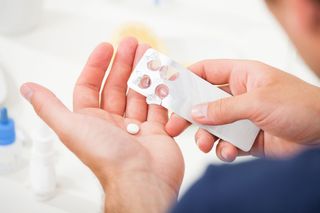
Study will test if hydroxychloroquine can prevent COVID-19
Researchers hope to have the results by summer.

The anti-malaria drug hydroxychloroquine has made headlines in recent weeks for its potential to help with the new coronavirus disease, COVID-19, though its benefits remain unproven. Now, a new study will test whether the drug can prevent COVID-19 transmission.
For the study, researchers in New York and Washington state plan to enroll 2,000 participants who are close contacts of people with confirmed or pending COVID-19 diagnoses.
Participants will be randomly assigned to take either hydroxychloroquine or a placebo for two weeks, and they will be tested daily for COVID-19, according to a statement from the University of Washington (UW), which will collaborate on the study with New York University (NYU).
The trial is expected to last eight weeks, and researchers hope to have the results by summer.
—Coronavirus in the US: Map & cases
—What are coronavirus symptoms?
—How deadly is the new coronavirus?
—How long does coronavirus last on surfaces?
—Is there a cure for COVID-19?
—How does coronavirus compare with seasonal flu?
—How does the coronavirus spread?
—Can people spread the coronavirus after they recover?
"Currently, there is no proven way to prevent COVID-19 after being exposed," Anna Bershteyn, an assistant professor of population health at NYU Langone Health and co-principal investigator on the study, said in the statement. "If hydroxychloroquine provides protection, then it could be an essential tool for fighting this pandemic. If it doesn't, then people should avoid unnecessary risks from taking the drug."
Hydroxychloroquine is a drug used to prevent or treat malaria, and one theory suggests it could prevent the novel coronavirus from entering cells, the statement said. The drug is also used to treat autoimmune disorders, including rheumatoid arthritis and lupus.
Participants will be monitored via telehealth and will collect their own nasal swab samples in order to preserve space at clinics for people who are sick, the researchers said.
Sign up for the Live Science daily newsletter now
Get the world’s most fascinating discoveries delivered straight to your inbox.
People who live in western Washington or New York City and have had close contact with someone with COVID-19 may be eligible for the study, according to the study's website. People interested in the study should contact their healthcare provider for more information.
The Centers for Disease Control and Prevention (CDC) has warned that hydroxychloroquine and the related drug chloroquine should only be used as prescribed medications under the supervision of a health care provider. In addition, people should never ingest non-pharmaceutical forms of chloroquine phosphate. Though some anti-parasite treatments for home aquariums include this ingredient, they are not intended for human consumption and can cause serious effects, including death, the CDC said. Recently, a man in Arizona died and his wife was hospitalized after the couple took the fish medicine in a misguided effort to prevent COVID-19, Live Science previously reported.
- Going viral: 6 new findings about viruses
- 20 of the worst epidemics and pandemics in history
- The 12 deadliest viruses on Earth
Originally published on Live Science.
The one-month trial gives you access to all of the educational site's 9,000 activities in reading, science, math and art. Keep your child busy and learning while we are all stuck indoors.

Rachael is a Live Science contributor, and was a former channel editor and senior writer for Live Science between 2010 and 2022. She has a master's degree in journalism from New York University's Science, Health and Environmental Reporting Program. She also holds a B.S. in molecular biology and an M.S. in biology from the University of California, San Diego. Her work has appeared in Scienceline, The Washington Post and Scientific American.
